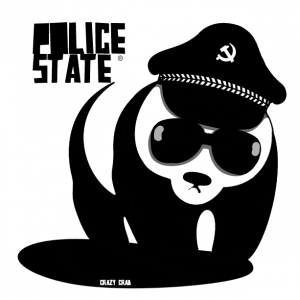The Word of the Week comes from the Grass-Mud Horse Lexicon, a glossary of terms created by Chinese netizens and encountered in online political discussions. These are the words of China’s online “resistance discourse,” used to mock and subvert the official language around censorship and political correctness.
guóbǎo 国宝

Panda Police (Artist: Hexie Farm 蟹农场)
Homophonous nickname for the Domestic Security Department (国保 Guó Bǎo), a branch of the police force within the Ministry of Public Security that handles political dissidents, human rights activists, petitioners, religious groups, and “subversive” activities.
DSD officials are more feared and reviled than the regular police, since they are not subject to the same oversight. They have been known to beat and illegally detain dissidents. Activist Hu Jia and artist Ai Weiwei have both been detained by the DSD before, while Liu Xia, wife of recently deceased Nobel-prize winning democracy activist Liu Xiaobo, remains under their watchful eye as she endures de facto house arrest.
The panda, China’s “national treasure,” is often used as a symbol of the DSD. Because of this association, innocuous Weibo posts about pandas are sometimes deleted.
Example:
Zhengmin (@郑敏): Surely the Butcher is also a “new media representative.” Is the technique for uniting these voices for fifty centers to interact with them online, and the national treasure to visit them offline?
屠夫也算是“新媒体中的代表性人士”吧,团结这类人士的手段难道是“线上五毛互动,线下国宝往来”? [Chinese]
DSD officials have been known to quote rights activists’ purportedly private WeChat voicemail messages. See also a CDT translation of writer Li Xuewen’s account of being asked to drink tea with Guangzhou-based DSD agents.







